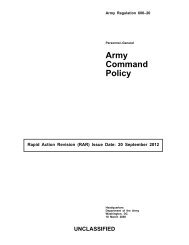Patient Administration - Army Publishing Directorate - U.S. Army
Patient Administration - Army Publishing Directorate - U.S. Army
Patient Administration - Army Publishing Directorate - U.S. Army
You also want an ePaper? Increase the reach of your titles
YUMPU automatically turns print PDFs into web optimized ePapers that Google loves.
(4) Establish a process whereby all patients not having other health insurance are queried about their other health<br />
insurance status upon discharge. Annually, thereafter, the patient must update and sign a new form on their first visit or<br />
admission in each 12 month period.<br />
d. For beneficiaries with coverage, the insurance company name and policy ID information-including employer<br />
name, address, and phone number, policy and group number, and member ID-will be obtained. Insurance information<br />
obtained during admission, discharge, or visit-including negative responses-should be entered on DD Form 2569.<br />
(DOD 6010.15-M contains instructions for the use of this form.)<br />
e. <strong>Patient</strong> interviews regarding health insurance coverage will be conducted according to instructions in the current<br />
DOD 6010.15-M. The patient should be asked if their admission/visit is due to an injury sustained in an accident<br />
(when, where, and type (for example, automobile, slip and fall, medical malpractice, work related, defective products,<br />
homeowners’/renters’, boat and airplane, etc.)). In addition, relevant accident insurance information (policy holder<br />
name, ID number and insurer name, address, phone number, etc.) and complete employment information should be<br />
obtained. The goal of the interview is to obtain employment, insurance, and accident information.<br />
14–6. Mandatory compliance by health insurance carriers<br />
a. Insurance companies and other health insurance plans must abide by the provisions of Public Law 99-272<br />
(incorporated into 10 USC 1095). Insurance companies cannot deny claims nor reduce payment on claims based on the<br />
fact that care was rendered in a Government facility. Claims reduced or denied for these and other invalid reasons will<br />
be referred to the appropriate Regional Claims Settlement Legal Office or designated legal office. Payment is not<br />
contingent upon the military facility entering into a participation or other agreement with the insurance entity. The<br />
current CFR also serves as a guide for the identification and documentation of payment denials for valid reasons.<br />
b. MTFs may reach an understanding with third party payers on claims procedures and other administrative matters<br />
if the understanding is not a precondition to complying with State and local statutory and regulatory requirements.<br />
14–7. Authorization to release medical information in support of the Third Party Collection Program<br />
a. MTFs must make available, upon request by third party payers, applicable health care records of the patients for<br />
whom payment is sought. This applies only to those records necessary to verify the services provided and that<br />
permissible terms and conditions of the plan were met. In these instances, the MTF must not charge payers for copying<br />
these records.<br />
b. TPCP personnel must inform patients, at the time insurance information is collected, that medical information<br />
relevant to an episode of care being billed must be provided to third party payers if requested. A specific authorization<br />
is required for release of alcohol and/or drug abuse, acquired immune deficiency syndrome, and sickle cell medical<br />
records. (See AR 40-66.)<br />
14–8. Claims activities<br />
a. Financial accounting for claims, collections, and the disposition of third party claims will be according to DOD<br />
7000.14-R, Volume 4.<br />
b. MTFs that generate third party claims will establish and maintain a claims action log. As a minimum, the data<br />
noted on the claims action log will include—<br />
(1) Documentation of all action taken on the claim. This includes but is not limited to the date of each action, names<br />
and phone numbers of persons contacted, and a brief summary of conversations.<br />
(2) Amount of claim.<br />
(3) Amount collected.<br />
(4) Reason(s) for invalid payment. An explanation of the reason for the invalid payment or disputed amount stating<br />
why the insurance company’s payment or denial is not a valid denial.<br />
(5) Disputed unpaid amount.<br />
(6) Final account disposition.<br />
c. The TPCP personnel must accurately prepare and submit claims to third party payers. The MTF must use the UB-<br />
04 or the CMS Form 1500.<br />
d. To the extent practical, there should be compliance with the data elements and code specifications of the National<br />
Uniform Billing Committee and the Uniform Claim Forms Task Force for submitting claims to third party payers.<br />
TPCP personnel must prepare and forward inpatient claims to the third party payer within 10 business days following<br />
completion of the medical record and outpatient claims within 7 business days after the outpatient service. The TPCP<br />
manager (or representative) should coordinate with the patient administrator or medical records administrator to ensure<br />
that medical records are coded within 30 days following the patient’s discharge from the MTF. In situations involving<br />
long-term hospitalization of beneficiaries, interim claims should be prepared on a periodic basis, not to exceed 90 day<br />
intervals.<br />
e. Claims processing and reporting will be performed according to the current DOD 6010.15-M.<br />
f. If an MTF provides certain high cost ancillary services or prescription drugs based on a request from a source<br />
other than a Uniformed Services facility and not incident to an outpatient visit or inpatient service at the MTF, the<br />
AR 40–400 27 January 2010/RAR 15 September 2011<br />
87
















